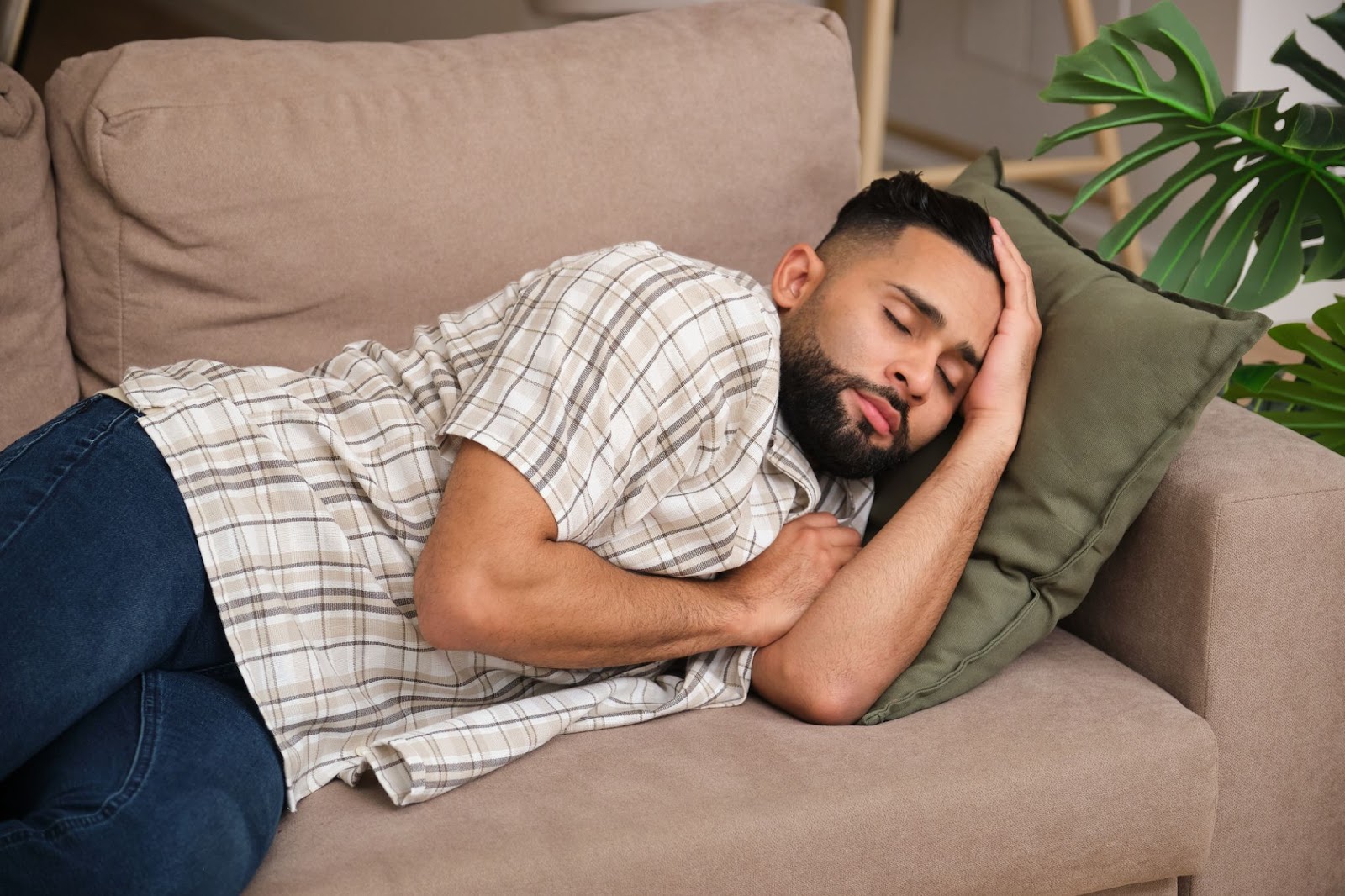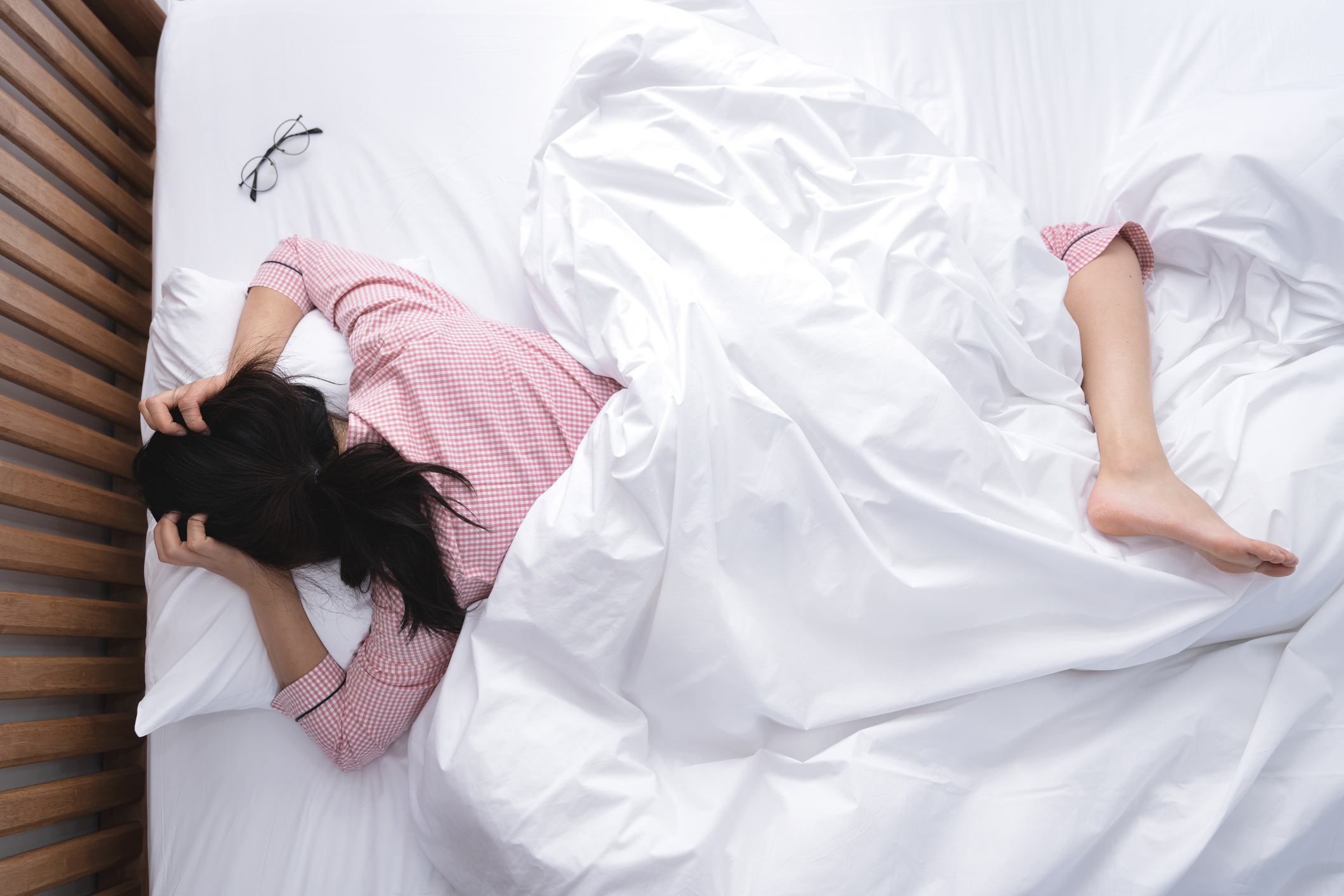Sleep
July 28, 2025
Why Can’t You Fall Asleep?
You can’t fall asleep because something mental, physical, or environmental is keeping your brain too alert to rest. Whether it's stress, caffeine, screen time, or a disrupted body clock, sleep doesn't simply happen. It depends on a delicate balance of hormones, habits, and brain activity.
When even one of these systems is off, falling asleep can feel impossible no matter how tired you are. Millions of people face this struggle every night, often without realizing their own routines or health conditions are interfering with sleep. But once you pinpoint what's getting in the way, falling asleep starts to get easier.
An Overactive Brain Can Keep You Awake
Many people who can’t fall asleep are stuck in a state of hyperarousal. This means the brain is overactivated, even if the body feels tired. You might feel physically fatigued but mentally “wired.”
Here’s what’s happening:
- The sympathetic nervous system, which controls your stress response, stays active when it should be shutting down.
- Cortisol, your main stress hormone, should naturally drop in the evening. But in people with insomnia, evening cortisol levels are often elevated.
- This overactivation delays the release of melatonin, the hormone that cues sleepiness.
- It also increases alertness in brain areas like the prefrontal cortex and amygdala, which are involved in worry, planning, and emotional reactivity.
Common triggers are work stress, anxiety, doom scrolling, and mentally stimulating activities close to bedtime. Clinically proven techniques include cognitive behavioral therapy for insomnia (CBT-I), breathing exercises, progressive muscle relaxation, and mindfulness-based stress reduction (MBSR).
Screen Time Before Bed Can Mess With Sleep
Screen use is a major sleep disruptor. Blue light and mental stimulation both interfere with your ability to wind down.
- Blue light (wavelength ~460 nm) suppresses melatonin production, delaying sleep onset.
- The pineal gland, which regulates melatonin, is especially sensitive to artificial light after sunset.
- Engaging content (social media, news, work emails) keeps your brain alert, increasing mental arousal and sympathetic nervous activity.
Even if you use “night mode” or blue light filters, they don’t block all the stimulating effects.
Best practice:
- Power down all screens 60–90 minutes before bed.
- Use amber lighting in the evening.
- Switch to non-stimulating activities like reading print books or light stretching.
Caffeine Lingers Longer Than You Think
Many people underestimate how long caffeine affects the brain.
- Caffeine has a half-life of 5–7 hours in most adults. That means if you have a 2 p.m. coffee, up to 50% of that caffeine could still be active at 9 p.m.
- It blocks adenosine, a sleep-inducing chemical that builds throughout the day.
- A 400 mg dose of caffeine, even when taken six hours before bedtime, significantly reduced total sleep time and disrupted sleep quality, confirming that caffeine’s effects can persist long after consumption (1).
Hidden sources include:
- Decaf (which still contains ~15 mg per cup)
- Chocolate
- Some pain relievers and energy drinks
If you’re sensitive, stop caffeine by 10 a.m. If not, aim for no caffeine after 2 p.m.
A Misaligned Body Clock Can Delay Sleep
Your circadian rhythm could be off, particularly if your sleep schedule doesn’t line up with your internal body clock. This rhythm controls when you feel sleepy or alert, and it also regulates hormone release and body temperature throughout the day. When disrupted, it can lead to conditions like Delayed Sleep Phase Disorder (DSPD), where falling asleep before 2 or 3 a.m. becomes nearly impossible. Roughly 10% of people with chronic insomnia are dealing with some form of circadian rhythm disorder.
Common causes include inconsistent bedtimes, lack of morning sunlight, too much artificial light at night, jet lag, or shift work. You can help reset your rhythm by getting 20 to 30 minutes of bright light in the morning, keeping the same wake-up time every day, and avoiding bright lights and screens after sunset. In more severe cases, chronotherapy or melatonin may be needed under a doctor’s guidance.
Worrying About Sleep Makes It Harder to Sleep
Sleep anxiety happens when the fear of not sleeping becomes the very thing that keeps you awake. Dreading bedtime creates mental tension, which activates the amygdala, your brain’s fear center, and raises adrenaline and heart rate. This state is the opposite of what your body needs to fall asleep. Over time, your brain starts linking the bed with anxiety instead of rest, which only reinforces the cycle. This is why sleep experts often say that trying harder to sleep usually makes things worse.
You might be dealing with sleep anxiety if you constantly check the clock, feel dread as bedtime approaches, or spiral into thoughts like “What if I can’t sleep again tonight?” The most effective treatment is Cognitive Behavioral Therapy for Insomnia, or CBT-I. It helps you break the mental link between bed and stress through techniques like stimulus control, which means getting out of bed if you're awake for more than 20 minutes, and cognitive restructuring, which teaches you how to challenge the anxious thoughts that fuel sleeplessness.
Your Bedroom Might Be Disrupting Your Sleep
Your sleep environment might be silently sabotaging your rest. The brain is highly sensitive to environmental cues, and your bedroom sends signals that either support or hinder sleep.
Common environmental disruptors include:
- Light exposure: Exposure to room light before bed may reduce melatonin levels and shorten sleep duration.
- Noise: Traffic, electronics, or partners snoring can keep the brain in a state of alertness. Nighttime noise increases sympathetic nervous system activity, raising heart rate and cortisol.
- Temperature: The body naturally cools before sleep. If your room is too warm (above 70–72°F or 21–22°C), it can prevent this cooling and impair both sleep onset and quality.
- Mattress and pillow discomfort: Pain or discomfort activates arousal systems in the brain. Chronic back or neck tension can delay sleep by increasing stress hormones.
- Clutter and visual stimulation: A messy or overstimulating room has been linked to increased anxiety and sleep difficulties.
Fixes that work:
- Use blackout curtains or a sleep mask.
- Set the thermostat between 60–68°F (15.5–20°C).
- Keep the room quiet or use white noise.
- Make your bed a dedicated sleep zone. No work and devices.
The environment shouldn’t make your brain work. It should help it let go.
Going to Bed Too Early Can Backfire
Many people confuse being “tired” with being “sleepy.” Tired means low energy. Sleepy means your brain is actively ready to fall asleep.
Going to bed when you’re not sleepy trains your brain to associate the bed with restlessness and frustration. This can lead to conditioned insomnia, where simply lying in bed triggers wakefulness.
Sleep experts recommend a strategy called sleep restriction therapy:
- Only go to bed when you feel genuinely drowsy.
- If you can’t sleep after 20–30 minutes, get up. Do something calm in low light. Return to bed only when sleepy.
- Maintain a consistent wake-up time, including after a bad night.
This strategy strengthens the brain’s association between bed and actual sleep, not tossing and turning.

Late or Long Naps Can Interfere With Night Sleep
Naps can be beneficial, but when timed poorly, they can make it harder to fall asleep at night. This happens because napping reduces your sleep pressure, which is the natural drive to sleep that builds the longer you stay awake. That pressure comes from adenosine, a brain chemical that gradually increases throughout the day. When you nap, especially for too long or too late in the day, you clear some of that adenosine and make it harder to feel sleepy at bedtime.
To avoid disrupting your nighttime sleep, keep naps short and early. Aim for less than 30 minutes, preferably before 2 or 3 p.m. If you already have trouble sleeping at night, it's often best to skip naps unless a sleep specialist recommends otherwise. Proper nap timing can help you recharge without interfering with your ability to fall asleep later.
Undiagnosed Sleep Disorders Could Be the Real Problem
Yes. If you constantly struggle to fall asleep despite good habits, it may be more than stress or behavior. A clinical sleep disorder could be at play.
Here are some possibilities:
- Sleep-onset insomnia: A chronic inability to fall asleep, often linked to hyperarousal, anxiety, or circadian misalignment.
- Restless legs syndrome (RLS): Causes uncomfortable leg sensations and an urge to move, worse at night and when lying still. Affects 5–10% of adults, per the NIH.
- Delayed Sleep Phase Disorder (DSPD): A circadian rhythm condition where your natural sleep window starts much later than socially acceptable times. Common in adolescents and young adults.
- Obstructive Sleep Apnea (OSA): Though better known for snoring and fragmented sleep, OSA can also delay sleep onset due to subconscious breathing discomfort.
- Narcolepsy or idiopathic hypersomnia: Less common, but both impact nighttime sleep stability as well.
If your sleep problem persists for more than 3 months and occurs at least 3 nights a week, it meets the clinical threshold for chronic insomnia and should be evaluated by a sleep professional.
Is It Time to Get Help for Your Sleep Struggles?
There’s a clearer, science-based way to find out what’s going on.
Nightly helps people find the real reasons they can’t sleep. Our free online sleep assessment was built by sleep specialists to pinpoint possible causes, from daily habits to underlying sleep disorders. It’s quick, practical, and backed by research.
Whether the issue is a delayed body clock, anxious thinking, hormonal shifts, or something medical, the results help guide your next step. No more guessing. No more lying awake, wondering why.
Start the free sleep assessment now to see what’s really standing between you and better sleep.
References
- Drake, C., Roehrs, T., Shambroom, J., & Roth, T. (2013). Caffeine Effects on Sleep Taken 0, 3, or 6 Hours before Going to Bed. Journal of Clinical Sleep Medicine, 09(11), 1195–1200. https://doi.org/10.5664/jcsm.3170

